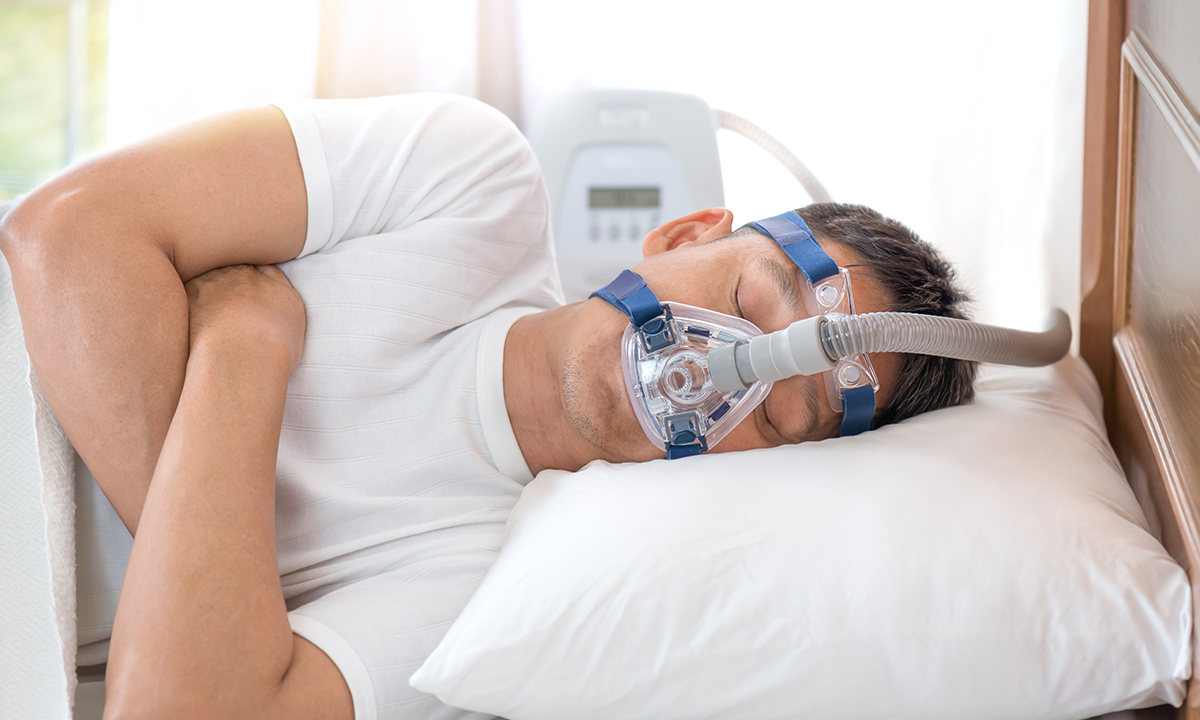THE link between obstructive sleep apnoea and cardiovascular disease was first reported nearly three decades ago, and has since been confirmed in many studies. People diagnosed with sleep apnoea are generally recommended continuous positive airway pressure (CPAP) therapy, which, if tolerated, is highly effective at relieving symptoms. But does it also lower the cardiovascular risk?
The answer is probably not, according to the authors of a new meta-analysis, published in the Journal of the American Medical Association. The study, which crunched data from 10 randomised clinical trials involving over 7000 people, found “no significant association” between CPAP therapy and major adverse cardiovascular events or all-cause death. Nor did it find any reduction in rates of acute coronary syndrome, stroke or heart failure in CPAP users, compared with sham treatment or no treatment.
What explains the findings? Co-author Bruce Neal, senior director at the George Institute for Global Health and Professor of Medicine at the University of New South Wales, said that there were three possible scenarios.
“The first is that sleep apnoea is a marker for increased cardiovascular risk and not an underlying cause. People with the condition tend to be older and overweight, and that’s what’s driving the adverse outcomes, not the sleep apnoea itself. And the second possibility is that there is in fact a beneficial effect of CPAP, but the trials have missed it, because they were too small or the adherence was too poor.”
But Professor Neal said that he personally leaned towards a third possibility, which is that although the cardiovascular risk of sleep apnoea is real, CPAP as it is currently delivered does not modify it.
“I think what our meta-analysis is telling us is that CPAP therapy is a great treatment for symptoms such as sleepiness, but it’s probably not going to prove to be an effective way of preventing death in terms of the associated risk factors,” he told MJA InSight.
It’s by no means a consensus view. In fact, in a linked editorial in JAMA, Associate Professor Daniel Gottlieb of the Harvard Medical School opined that the paper’s conclusions were “premature”.
Dr Gottlieb said that there was a “paucity of informative clinical data” concerning CPAP and cardiovascular risk. He also noted the low adherence rates in most of the studies, in particular the largest, SAVE, where the mean nightly adherence was only 3.3 hours.
But in a sub-analysis of the SAVE study, patients who used a CPAP machine for 4 or more hours a night had a 20% lower risk of the primary endpoint of cardiovascular events.
Dr Garun Hamilton, director of sleep research at Melbourne’s Monash Health, also zeroed in on the adherence issue.
“There’s another recent meta-analysis with essentially the same results as the JAMA paper, but which found that if you looked separately at people who adhered well to the treatment, they did have a benefit. The trouble is that we can’t rule out healthy user bias. But it does raise the possibility that maybe why we haven’t been able to find an overall benefit is that adherence just isn’t good enough in the real world.”
Professor Neal said that the problem with this argument was that in his meta-analysis, risk of cardiovascular events trended slightly down for CPAP users, while risk of overall death trended up.
“If we got better adherence, we’d expect results to become more extreme. But the fact that these two endpoints are trending in opposite directions suggests that the truth is somewhere around the null.”
But he accepted that adherence was an issue that could possibly cloud trial results.
“Ultimately there are two things we need for more clarity. First, we need bigger numbers and more events. But the other thing we really need is a mode of CPAP that people can adhere to well.”
Dr Hamilton agreed that larger numbers were needed before we could be sure about the cardiovascular effects of CPAP.
“My own view is that there’s a small benefit with CPAP. But in order to demonstrate that, we probably need many more studies with many more thousands of patients. I do think there’s a chance that we’ll never really know. Sadly, we won’t be able to study the group that’s most symptomatic in randomised trials because we won’t want to withhold treatment for their symptoms. If there’s some revolutionary change with CPAP delivery it’ll be worth revisiting, but I think for the moment it’s just going to be really hard to know.”
Dr Hamilton said that the take-home message from the research so far is that CPAP is safe, and that if there’s any reduction in cardiovascular risk, it won’t be great.
“In terms of clinical implications, I’d say it’s best to have a low threshold for trying CPAP. But if the patient can’t tolerate it, you can reassure them that going off the treatment doesn’t present any significant risk of harm for them.”
The message of his study certainly wasn’t that CPAP therapy was a waste of time, Professor Neal said.
“CPAP is really great for symptoms, and we shouldn’t underestimate the importance of that. You wouldn’t want people abandoning their CPAP on the strength of results like ours. You want people talking to their doctor before they make any decision.”
To find a doctor, or a job, to use GP Desktop and Doctors Health, book and track your CPD, and buy textbooks and guidelines, visit doctorportal.

 more_vert
more_vert
I have been using a CPAP device for 4 years. I get a good nights sleep, and my wife also benefits. I would never be without it.
A good sleep must be a benefit in that being less tired and less stressed must contribute cardiac health. I believe it, so that’s a plus